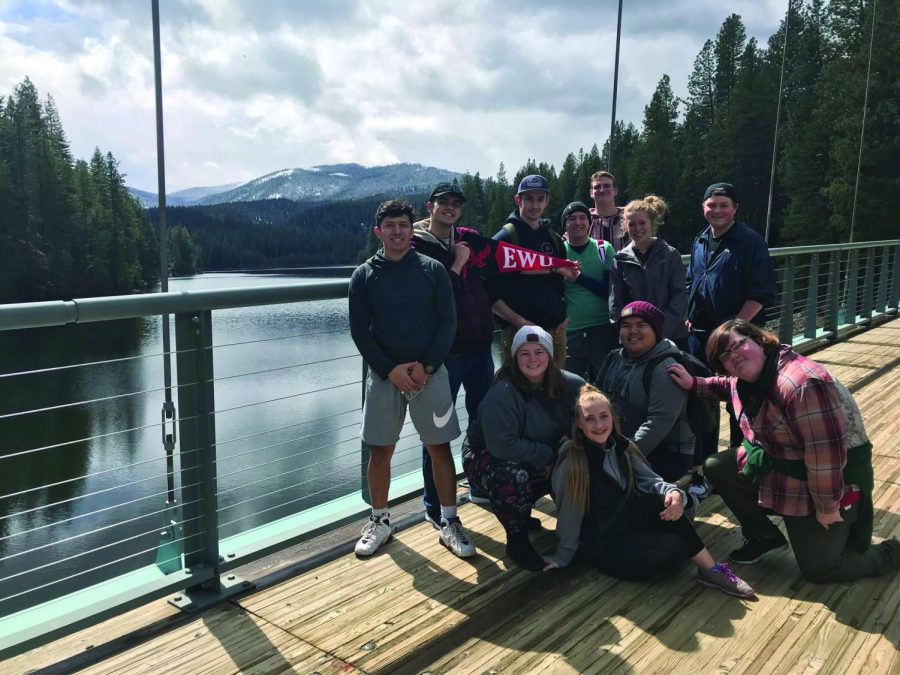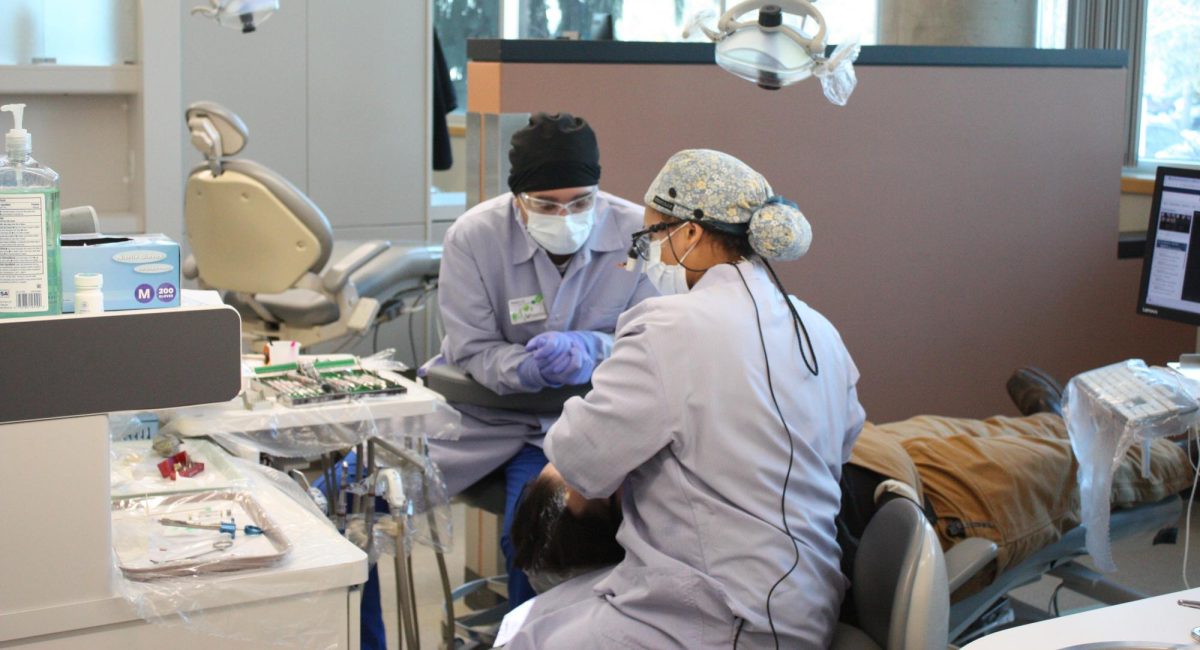A different way to spend spring break
Students of the Alternative Break Club pose for a photo around Lake Siskiiyou near Weed, California:(Left to right, back row first) Alex Martinez, Dalton Emerson, Matt Watkins, Willie Stoutzenberger, Garrett Harty, Baylee Buchanan, Noah King ; Shelby Shackelford, Jonny Vorachak, Sarah Colerick and Dakota Mullikin | Photo courtesy of Anna McNamara
April 12, 2018
If one ever catches themselves wondering what good they can do during their academic break, they should consider looking into the Alternative Break Club.
Anna McNamara, the Residential Life Coordinator for Morrison Hall, founded the club a year ago. McNamara is originally from the southeast and has been at EWU for a year and a half now.
McNamara was interested in starting this club because she once attended an alternative break during college herself and saw that EWU didn’t provide this option for its students.
“Something that I’ve learned about students and people who are from the Pacific Northwest is that they do not leave the Pacific Northwest,” McNamara said. “People are very happy here which is awesome, but there is a lot of different perspectives and a lot of history that comes in other parts of the country.”
One of McNamara’s goals for the club is to get students to be able to be a part of that.
“Can you see a mountain that has cacti instead of trees, or like on the East Coast mountains are rolling hills compared to down here,” said McNamara. “See the history that comes with other parts of the world, starting with the United States. If you are talking about social justice, diversity or world issues you are able to kind of get your hands on what it means to be an advocate to create social change.”
The easiest way to see that is through community service.
McNamara’s decision on where to take the group of students this year was made randomly. It started with a lot of research into nonprofit organizations that host weeklong trips.
“We looked into the community garden outside of Portland where the homeless population can work on the garden and have a place to live,” said McNamara. “On the coastal areas we contacted some state parks to see if we can do clean up, but specifically we worked with Habitat for Humanity.”
Habitat for Humanity does something called the collegiate challenge. It is where communities set up weeklong trips and they look for partnerships with local organizations or local churches to provide free housing.
Students who attended paid a fee of $125. That fee covered the habitat fee, the cite fee and it covered transportation and food for the trip. Since the location was within driving distance from EWU it helped keep the trip’s costs lower.
This year the club also raised about $1,000 and was actually able to get t-shirts for this trip. ASEWU also donated $1,000 to the club. That helped the club with its transportation costs. Another organization on campus that helped was the National Residence Hall Honorary. They paid for two students to go and also donated another $500 on top of that.
“Because of those three big donors and the [low] cost, we’ve been able to save a little bit more so we will have a pillow so we can get that second trip next year,” McNamara said.
McNamara took 11 students this spring break to Weed, California for five days. Weed caught McNamara’s attention because of the wild fires that destroyed the town last fire season. She saw this community that has a low income and an older age population as a great education piece. The fire wasn’t big enough for federal aid, so McNamara was interested in seeing how one recovers from this situation, when you don’t have homeowner insurance but you lose everything.
“Giving students the chance to learn that, but also leadership and teamwork,” said McNamara. “The students who went this year built an entire deck or put siding up on two sides of the house. There’s a lot of confidence-building with that. Working together to make sure you do that. Those developmental pieces and kind of growing up are some keys of what I am hoping to teach and instill with the folks that go.”
Senior Willy Stoutzenberger, who attended the trip, liked the fact that it was apparent that they were having an influence in the community.
“The people that were hit by the wildfire came up to us and they told us about how much they appreciated our service that we were doing for them,” Stoutzenberger said. “That, I think, is probably the biggest part of why this is so important. Often times you volunteer but you don’t exactly see the direct impact, but being there, learning new things, being in a completely different environment, knowing nothing about how to build a house, but attempting to build a house. It is shocking about how much you can do with nothing.”
Even though only 11 students went, they all built a small community within themselves.
“You really learn to bond with those people and each night we would do team-builders and things of that nature,” said Stoutzenberger. “We showed appreciation to each other and that was something I really enjoyed.”
McNamara would like to do two trips next school year. She’d like to return to Weed, as well as go someplace else within the country.
“I would love to get students to the southeast or in the Appalachian Mountains,” said McNamara. “That is an incredibly impoverished area. There is a lot of education that can go into meeting people that don’t have access to running water, because that’s a thing in the United States.”
McNamara is also considering going to states that were affected by hurricanes, like Florida or Texas. She is also looking into working with LGBTQ+ communities in bigger cities and getting connected there as well.








